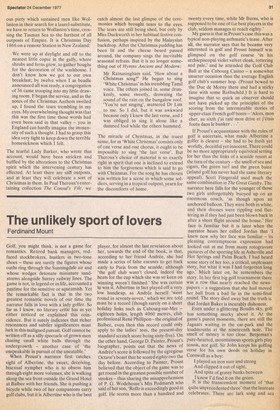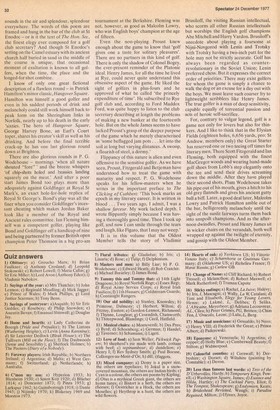The unlikely sport of lovers
Ferdinand Mount
Golf, you might think, is not a game for romantics. Retired bank managers, redfaced stockbrokers, hustlers in two-tone shoes — these are surely the figures whose oaths ring through the Sunningdale air and whose wedges detonate miniature sandstorms alongside Surrey railway lines. The game is not, in legend or in life, accounted a pastime for the sensitive or squeamish. Yet the remarkable fact is that in the two greatest romantic novels of our time the narrator falls in love with a lady golfer. So far as I know, no literary critic has as yet either noticed or explained this coincidence. But it surely indicates that richer resonances and subtler significances must lurk in this maligned pursuit. Golf cannot be written off as a silly spectacle of grown men chasing small white balls through the undergrowth — another case of 'the unspeakable in pursuit of the uneatable.'
When Proust's narrator first catches sight of Albertine, the sweet, deceiving, bisexual nymphet who is to obsess him through eight more volumes, she is walking along the sea front outside the Grand Hotel at Balbec with her friends. She is pushing a bicycle while two of her companions carry golf clubs, but it is Albertine who is the best player, for almost the last revelation about her, towards the end of the book, is that, according to her friend Andree, she had made a series of false excuses to get back early to Paris from the seaside, although 'the golf club wasn't closed, indeed the heats for the cup which she was so keen on winning weren't finished.' She was certain to win it, Albertine in fact played off a very low handicap, as Andree herself 'went round in seventy-seven,' which we are told must be a record (though surely on a short holiday links such as Cabourg-sur-Mer — eighteen hotes, length 4060 metres, club professional Rene Phillipon— the original of Balbec, even then this record could only apply to the ladies' tees, the present-day standard scratch score being sixty-five). On the other hand, George D. Painter, Proust's biographer, points out that the news of Andree's score is followed by the egregious Octave's boast that he scored eighty-two the day before. According to Painter, Proust believed that the object of the game was to get round in the greatest possible number of strokes — thus sharing the misapprehension of P. G. Wodehouse's Mrs Podmarsh who said of her son, 'Rollo is exceedingly good at golf. He scores more than a hundred and twenty every time, while Mr Burns, who is supposed to be one of tile best players in the club, seldom manages to reach eighty.'
My guess is that in Proust's case this was a typical non-playing asthmatic's tease. After all, the narrator says that he became very interested in golf and Proust himself was glimpsed on the golf course 'in his archiepiscopal violet velvet cloak, tottering and pale,' and he attended the Golf Club Ball at the Cabourg Casino — a somewhat smarter occasion than the average English golf club's summer hop. (Proust bowed to the Duc de Morny there and had a sticky time with some Rothschild.) It is hard to imagine that so quick an observer should not have picked up the principles of the scoring from the interminable stories of upper-class FrenCh golf bores — 'Alors, mon cher, au sixth j'ai rate mon drive et j'etais foutu dans le bunker . , If Proust's acquaintance with the rules of golf is uncertain, what made Albertine a golfer is clearer — she had to be fresh yet worldly, deceitful yet innocent. There could be no more appropriately equivocal setting for her than the links of a seaside resort at the turn of the century — the smell of sea and cigars, the green turf and the green baize (inland golf has never had the same literary appeal). Scott Fitzgerald used much the same combination in The Great Gatsby. The narrator here falls for the younger of those two girls unforgettably buoyed up on an enormous couch, 'as though upon an anchored balloon. They were both in white, and their dresses were rippling and fluttering as if they had just been blown back in after a short flight around the house.' Her face is familiar but it is later when the narrator hears her called Jordan that 'I knew now why her face was familiar — its pleasing contemptuous expression had looked out at me from many rotogravure pictures of the sporting life at Asheville and Hot Springs and Palm Beach. I had heard some story of her too, a critical, unpleasant. story, but what it was I had forgotten long ago.' Much later on, he remembers the story. In her first big golf tournament there was a row that nearly reached the newspapers — a suggestion that she had moved her ball from a bad lie in the semi-final round. The story died away but the truth is that Jordan Baker is incurably dishonest.
Even under a glittering Boudin sky, golt has something murky about it. At the game's purest moments, there are still the Jaguars waiting in the car-park and the loudmouths at the nineteenth hole. The smell of money is too close. Betjeman's pure-hearted, mountainous sports girls play tennis, not golf. Sir John keeps his golfing verse for his own deeds on holiday in Cornwall as a boy: I played an iron sure and strong And clipped it out of sight, And spite of grassy banks between I knew I'd find it on the green. It is the transcendent moment of 'that quite unprecedented three' that the laureate celebrates. There arc lark song and sea sounds in the air and splendour, splendour everywhere. Thc words of this poem are framed and hung in the bar of the club at St Enodoc — or is it the text of The Hon. Sec, the finest elegy ever composed for a golf club secretary? And though St Enodoc's setting on the Camel estuary with its ancient church half buried in sand in the middle of the course is unique, that occasional moment of exultation is known to all golfers, when the time, the place and the longed-for shot combine.
I know of only one great fictional description of a flawless round — in Patrick Hamilton's minor classic, Hangover Square. Hamilton was himself a good golfer and even in his saddest periods of drink and melancholy could still work himself back to peak form on the Sheringham links in Norfolk, nearly up to his death in the early 'sixties. The hero of Hangover Square, George Harvey Bone, an Earl's Court Loper, shares his creator's skill as well as his drinking. And before the final terrible crack-up he has one last glorious round down at Brighton.
There are also glorious rounds in P. G. Wodehouse — mornings 'when all nature shouted "fore" ' and the breeze whispers 'of chip-shots holed and brassies landing squarely on the meat.' And after a poor start James Bond too plays more than adequately against Goldfinger at Royal St Mark's, an exact hole-for-hole replica of Royal St George's. Bond's play was all the finer when you consider Goldfinger's incessant cheating which makes Jordan Baker look like a member of the Royal and Ancient rules committee. Ian Fleming himself was a competent golfer, playing like Bond and Goldfinger off a handicap of nine and being partnered by former British open champion Peter Thomson in a big pro-am tournament at the Berkshire. Fleming was not, however, as good as Malcolm Lowry, who was English boys' champion at the age of fifteen.
Even the non-playing Proust knew enough about the game to know that 'golf gives one a taste for solitary pleasures'. There are no partners in this kind of golf. There is only the shadow of Colonel Bogey, the ever-present reminder of the Platonic ideal. Henry James, for all the time he lived at Rye, could never quite understand this obsessive aspect of the game. He liked the sight of golfers in plus-fours and he approved of what he called 'the princely expenditure of time'. He subscribed to Rye golf club and, according to Ford Maddox Ford, was quite happy to listen to the club secretary describing at length the problems of making a new bunker at the fourteenth hole. But on the whole James seems to have lacked Proust's grasp of the deeper purpose of the game which he merely characterised as 'some beflagged jam pots. . . let into the soil at long but varying distances. A swoop, a flourish of steel, a dormy.'
Flippancy of this nature is alien and even offensive to the sensitive golfer. As we have seen, Proust, Fitzgerald and Betjeman have understood how to treat the game with maturity and respect. P. G. Wodehouse speaks for his fellow-masters when he writes in the important preface to The Clicking of Cuthbert: 'This book marks an epoch in my literary career. It is written in blood . . . Two years ago, I admit, I was a shallow farceur. My work lacked depth. I wrote flippantly simply because I was having a thoroughly good time. Then I took up golf, and now I can smile through the tears and laugh, like Figaro, that! may not weep.'
It is in this volume that the Oldest Member tells the story of Vladimir Brusiloff, the visiting Russian intellectual, who scorns all other Russian intellectuals but worships the English golf champions Abe Mitchell and Harry Vardon. Brusiloff's anecdote about playing a foursome at Nijni-Novgorod with Lenin and Trotsky with Trotsky having a two-inch putt for the hole may not be strictly accurate. Golf has always been regarded as counterrevolutionary in the Soviet Union; Lenin preferred chess. But it expresses the correct order of priorities. There may exist golfers for whom the game is simply a chance to walk the dog or an excuse for a day out with the boys. We must leave such coarser fry to lightweight scribblers like Henry James. The true golfer is a man of deep sensitivity, capable equally of torrential passion and acts of heroic self-sacrifice.
For, contrary to vulgar legend, golf is a game not only for lovers but also for thinkers. And I like to think that in the Elysian Fields (eighteen holes, 6,656 yards, pro: St Andrew, members only) the Great Starter has reserved one or two teeing off times for literary men. There Scott Fitzgerald and Ian Fleming, both equipped with the finest MacGregor woods and wearing hand-made golf shoes from Lobb's step elegantly onto the tee and send• their drives screaming down the middle. After they have played their second shots, Plum Wodehouse takes his pipe out of his mouth, gives a hitch to his old grey flannels and gives his ancient gutty ball a biff. Later, a good deal later, Malcolm Lowry and Patrick Hamilton amble out of the bar, belligerently melancholy until the sight of the sunlit fairways turns them back into unspoilt champions. And as the afternoon dwindles, Proust and Henry James sit in wicker chairs on the verandah, both well wrapped up against the twilight of eternity, and gossip with the Oldest Member.











































 Previous page
Previous page